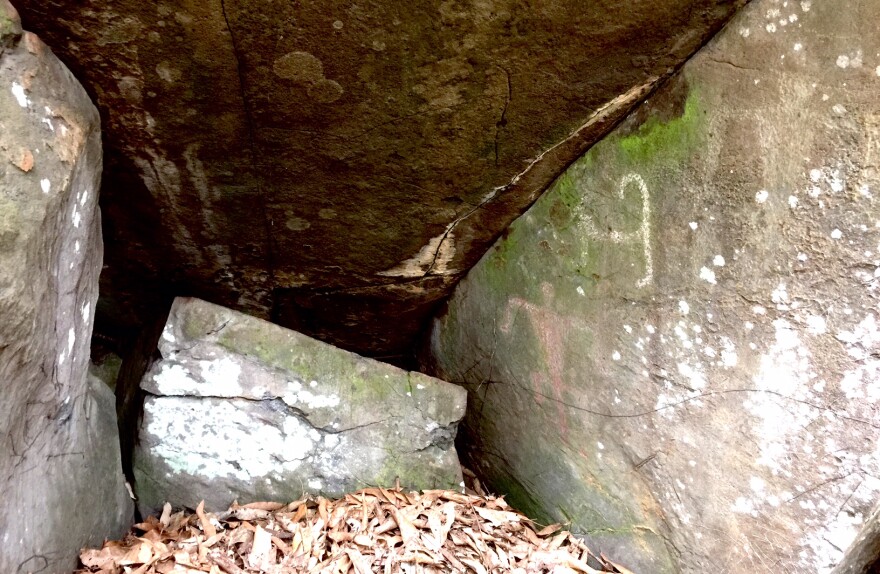One of the great pleasures of living in a place, is learning the stories about its nooks and crannies. In HPR’s Hometown collection, we visit places of historical or cultural interest that may be easy to miss. Today in Hometown Honolulu, HPR’s Noe Tanigawa visits a memorial right outside the State Archives, and a petroglyph site in Nu‘uanu.

K? Ching, is a cultural practitioner and former OHA trustee, currently living on Hawai‘i island. Recently in Honolulu, he agreed to visit some old haunts down town. We began at the State Archives, the low, beige building between the main library and ‘Iolani Palace.
On the right of the entrance, t? leaves flank a large standing rock, with a cast metal plaque. On the plaque, a portrait and the inscription, "Captain James Cook Forerunner of Modern Civilization in the Pacific Ocean. In Hawai‘i 1778-1779."

Ching: I’m looking at the bottom, in memory of the high Chief Hoolulu, High Chiefess Kinoole, and her son, Keolaokalani . When Kamehameha died, there were two guys and a wahine there. Ka‘ahumanu, his favorite wife and the time, and Hoolulu and his brother were with Kamehameha when he died. The brother was Ulumaheihei. They were some of his most trusted friends and everything. These two guys were sons of Kamanawa.
Ching: Who was Kamanawa? He was one of two twins on the Hawai‘i seal. These two guys Hoolulu and Ulumaheihei were the guys that did whatever to the bones of Kamehameha and then took them out and hid them. So it’s really crazy that this plaque was made for James Cook but in memory of these guys! I didn’t know about this stuff on the bottom until today.
Ching points to a rectangle pf hewn lava at our feet. It’s huge, over five feet by two feet by eighteen inches, it’s kind of sunken into the ground in front of the Cook monument.
Ching: People used to stand on this stone to read this thing, and there probably has been more than one person killed for stepping on this stone. Read the thing.
A nearby sign says “L?loa was a sacred high chief from Waipi‘o Valley on Hawai‘i Island, During

construction of a walkway to his residence, L?loa himself brought this large stone to the threshold. Only he and his chief attendant were allowed to step on the paepae kapu because he had carried it on his shoulders. All others entered the house through a different door. “
The story continues, once, traveling incognito, L?loa’s liaison with a commoner led to the birth of a son, Umi. When Umi came of age, he took “chiefly tokens” L?loa had given his mother, and ventured to his father’s home to claim his birthright.
Ching: His mother told him, you go over there, that guy is your father. Take these things and your father will recognize you as his son. So he goes there, steps on this stone and jumps in L?loa’s lap. His father recognizes him, makesit all okay and everything. So that’s the rock. And Kal?kaua should never have brought that here—it need s to go back to Waipi‘o.
Do not step on that rectangular stone in front of the Cook monument. Just 15 minutes from the State Archives, up Nu‘uanu Avenue, Ching headed back through the lower parking lot of Nu‘uanu Mortuary.
The pavement ends and a well packed trail wends its way along Nu‘uanu Stream.

Ching: See that is a trail, an ancient trail in the public domain. Somebody’s been working along the trail here. Not very long ago, it was narrow and hard to see. So this is the trail, among other things it goes to Kapena Falls.
Ching: The interesting thing about it is, a lot of the blocks here, have stuff written on them. It’s somewhat modern. Maybe a hundred years ago. One of these stones has an elephant on it!!
There’s an elegant inscription from 1896! Some do look very modern or even fairly contemporary. Cute though.
Ching: Okay, turn around, up here, there’s a little cave, right through there, there are some beautiful petroglyphs in it.
Sure enough, behind some iron bars, there’s a triangular stick human, and reddish one that looks more

Keith Haring. Some have been chalked, another four legged one has a waggy tail. In fact, this Nu‘uanu site is known for dog imagery. Marques Marzan, cultural advisor for Bishop Museum, says these petro glyphs have been mentioned since the 1930’s and are noted in the 1970’s compendium, Sites of O‘ahu.
Marzan: I don’t recall particular stories being related to those petroglyphs in Nu‘uanu, but I know in Nu‘uanu there were a lot of mo‘olelo or stories associated with dogs. It’s not probably a coincidence that there are a lot of dog imagery in petroglyph form on the stones there in Nu‘uanu.

In another spot, are the rainbow men, the triangular figures with bows on their shoulders we see in logos. In another, three fabulous dog images with a lot of personality.
Ching: These are my favorite petroglyphs bar none. I volunteer to take your camera and take a picture of one petroglyph. Hold onto that, and don’t blame me for putting pornography in your camera.
Ching went down a slope and returned with some very naturalistic imagery of yes, two dogs. A lot of people have enjoyed their time along Nu‘uanu Sstream, and left mementos in stone.




